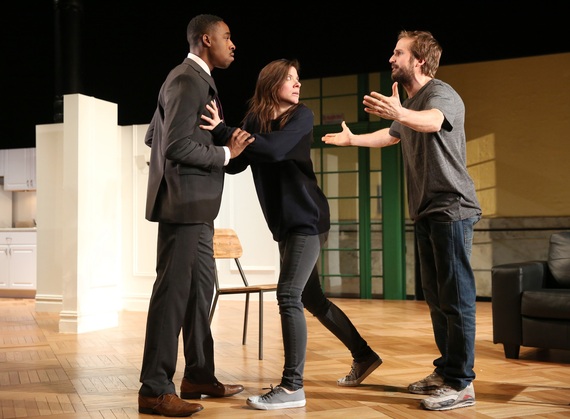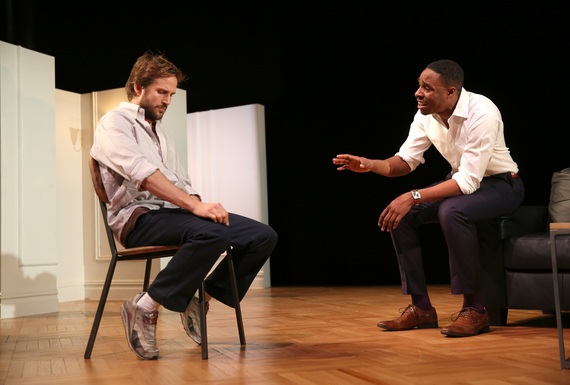"I was here before all of the hippies and the yuppies showed up," my first Brooklyn landlord told me. My tiny space on the top floor of a decaying row house was my stake in the ground. Young and striving, I had something to prove. I could live on my own. In New York.
No matter that there was no sink in the 4'x4' bathroom or the slanted staircase creaked so ominously that I'd warn anyone over 85 lbs. to be very, very careful ascending them. It was my own Pyrrhic housing victory, with the occasional mouse or eerie neighbor's leer to remind me of the price of hubris.
That is, to some degree, what gentrification looks like. It's not all bulldozers and condos and lawyers. It's often far more subtle. College grads slowly unpacking in the dusty attics of ethnic enclaves.
In Tracey Scott Wilson's new play "Buzzer" now at The Public Theater in New York City through April 26, a young couple, Jackson (Grantham Coleman) and Suzy (Tessa Ferrer), moves back into Jackson's old neighborhood. It's not much better than when he "got out" on a scholarship and followed a sterling educational path to indeed become one of those lawyers who moves into an ethnic enclave and buys a building.
The nabe's on a real estate upswing, but there are still unemployed young men who congregate on the corner. Violence is regularly reported in the papers and amenities like apartment buzzers don't work in even the nicest of buildings.
"Buzzer" promised to be a drama full of timely tension about an African-American man and his white girlfriend, gentrification, racial lines and modern city life. The intent is intriguing, but ultimately falls flat in the execution under Anne Kauffman's direction. It's perhaps unfair but inevitable to compare it to Bruce Norris's 2011 Pulitzer winner "Clybourne Park," a brilliant tale of Chicago gentrification and the pulsating racism just below the characters' urban-chic dinner party banter.
Instead, "Buzzer" weaves a pretty implausible plot in which Suzy, a tightly-wound Harvard grad and inner-city teacher, puts up with unceasing street harassment as well as her boyfriend's in-recovery pal Don crashing in their new pad for six months. That such a successful man as Jackson would endure this tests the limits of believability. (Dude, just rent the place out while it appreciates in value.) This isn't like Senator Cory Booker moving into Newark, NJ pubic housing to make a political stance. We're to suspend disbelief that a successful private-practice attorney compromises daily contentment for some local-boy-made-good recognition and a washer-dryer set.
Unfortunately, the weakness of the plot isn't shored up by sparkling or poetic language. Jackson: "It's what we talked about, Suze. Going back. Giving back. Saving all the little Jacksons and Jacksonettes out there. I'm serious about this, Suze. Serious about us."
The highlight of the action is Michael Stahl-David who plays Don, a well-meaning and lovable recovering addict, (and who, in another world, could have easily played Jesse Pinkman in "Breaking Bad.") His character is also the best-written of the trio. Coming from the wealthiest family of the friend group, Don is also the most color-blind. He approaches the street kids as individuals and not a fearsome monolithic group, while the other two consistently get in their own way, stumbling over racism, pride and fear.
The true stars of this production are the sound and set designers -- that's not a jab at the playwright, actor or directors. The sound and set are excellent. Bray Poor captures the urban soundscape of car horns, bus brakes and late-night yelling and laughing against Laura Jellinek's set design of an enviable apartment with crown molding and stainless steel appliances. Together, these elements may best show Wilson's intent: the dream of an aspirationally perfect interior to soothe past frustration and pain, surrounded by the unrelenting reality of imperfection and discontentment.
The buzzer was broken in my first New York apartment. People had to call up -- by cell phone or by voice -- to announce their arrival. I eventually moved. And the buzzer in my current building works just fine.


